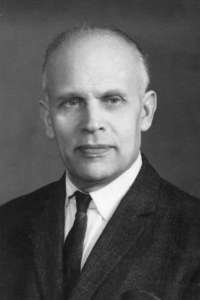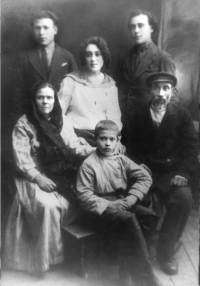|
BIOGRAPHY OF SEMEN TARAKHOVSKII
Semen Tarakhovskii was the youngest of six children born to Elya Tarakhovskii, my great-grandfather's brother. Elya's eldest son emigrated to the US in 1913, but all the others, including Semen, stayed in the Ukraine, although he and his other brothers later moved to Russia. Here, Semen's son, Yury Tarahovsky, tells his father's life story.
My father Semen (Senya) Tarakhovskii was born on August 17, 1912 and died on August 16, 2002. That day, August 16, I visited him and we were preparing for his 90th birthday. It happened that his big old clock on the wall had stopped and I had bought and hidden a new one to present him on his birthday. He was ill and was uncomfortable on that long day because he did not know the time. I told him that the “new time” will start tomorrow. How could I know that my father would have not been there in the “new time” and I would never present him a new clock?
My father was very modest man and worked hard his whole life. But, if one looks closer, he was a great man with a big potential. I do not know how these two sides coincided in one person. In my mind, he was a soldier, someone who was always alert, kept his eyes open, and never took a rest. On that last day of his life, he was still upright and fallen down as a tree.
His life was full of dramatic events. Actually, the history of my country was dramatic, and almost anyone who lived at that time could tell an incredible story. I know my father’s story. Sometimes it sounds unbelievable, because the life that time was unbelievably different from how it is now.
When he was 13, the first tractor came to their village. It was something extraordinary and nobody had seen tractors before. My father believed that the tractor was presented by USA to the Soviet country. I do not know who donated it and I could not find an explanation in the history books. My father was always near the mechanical shop and soon learned how to work the machines. Finally, he was the youngest who was sent to the nearest city to take classes in tractor driving. But he already knew everything and got the licence in a few weeks while much older people stayed there for a number of months. Later, when he was 14, more tractors came and my father was appointed as a head of a team. All the people in the team were much older. I guess the reason was that my father knew the technical stuff better.
Very early, he began to help his father as a hammer smith and this work made his muscles extraordinarily strong. In his later years, he worked as a photographer, but was still very strong. He never did any exercise but, once, in his 50s, he took a 32kg weight (Russian giria) and flipped it up as a ball. Then, he lifted it up above his head with his little finger! I never met anybody whose fist was larger and whose biceps were harder than my father’s, even though he was rather short, only 165-167cm.
He left his family at an early age and moved to Kharkov city to attend the construction of famous Kharkov Tractor Plant and later worked there as an operator of a big machine hammer. The term “operator” meant that he had to move manually the huge, white-hot metal bars with a clip. The temperature was so high that his partner had to constantly water him through a nozzle! He had to take new clothes every week because the fabric did not sustain the heat. I guess his health would not have sustained either, if he not had been drafted into army.
Traditionally, Russian army service starts for a man at the age of 18. At that time, my father smoked heavily and the army doctor said, “Such a strong boy, but your lungs are full of soot”. It was possible that this was the first doctor my father met and he was impressed very much. He threw away his cigarettes and was not smoking for 3 days. Then, he asked his friend for a cigarette and it made him very sick. After that, he never smoked again for the rest of his life. Do you know anybody who can stop smoking in three days and forever? I do not.
He was in the army till the end of the Second World War in 1945. According to a calculation, this should be at least 15 years! I am not sure it is true. Probably, he worked in Kharkov after he was first drafted and until he was drafted in the second time, when the war started. He told a lot of stories about his army life. He participated in battles and was awarded military decorations, though possibly not of very high significance, but he had never talked about them. What was remarkable was that, once, he was asked to draw portraits of famous commanders for the headquarters gallery. He did a lot of charcoal portraits, though he had never had drawing classes. He was told that the officers were satisfied, but someone found in the charcoal lines something resembling a Nazi swastika. In the time of Stalin’s terror, this could mean the death penalty. Finally, the problem was somehow solved but, after that he never drew again. He was a really talented person. Like many members of his family, he played the violin, and it seems, it was the greatest pleasure of his life, but unfortunately, he never did it in my presence.
My father was married to Anna Lvovna Amstislavskaia. I do not know the year or place of their marriage but, on May 31, 1938, my brother Eduard was born. I was born 14 years later, on March 17, 1952. The Second World War came between these two events. My father said that when, in 1945, my brother was supposed to be sent to school, he was so thin that the doctor suggested he wait one year more. I guess two children in one family could not survive. I was born in a nice city with the ancient Greek name of Mariupol, located on the Sea of Azov. But, by that time, the name of the city had been changed to the name of a communist leader and anti-Semite, Zhdanov. It could have had a symbolic meaning because, in 1956, my father suddenly lost his job. He was a photographer and could have found a job in many places. He had a lot of offers but, after interviews, they took his documents and, a week later, he was inevitably refused. In the beginning, it looked like a mystery until somebody explained that they took his papers to learn his nationality. After that, my family had to move from the Ukraine to a small town in the south of Russia called Kamensk. But it was not the place where my father intended to live. He worked hard. I almost did not see him at home. In four years, he managed to collect money and move our family to a big city, Rostov-on-Don (Rostov-na-Donu). Now he worked in a nice photo-studio located in a recreation area. My brother attended the university and I could go to a good school. But, in 1962 my mother died. In approximately 1968, my father remarried Tamara Popova. She was a very good woman and I called her mother. She died in 2004.
|


